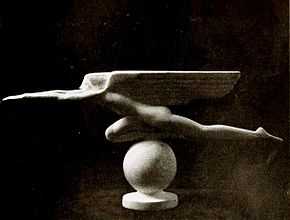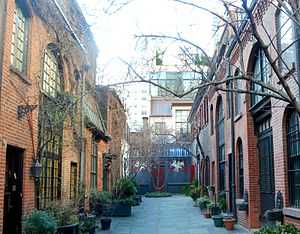Harriet Whitney Frishmuth

Harriet Whitney Frishmuth (September 17, 1880, Philadelphia, Pennsylvania – January 1980, Waterbury, Connecticut) was an American sculptor known for her works in bronze.[1]
Life
Her parents divorced when she was in her teens, and she lived in Europe with her mother and sisters for eight years. She studied briefly with Auguste Rodin at the École des Beaux-Arts in Paris, and for two years with Cuno von Uechtritz-Steinkirch in Berlin. She returned to the United States, and studied at the Art Students League of New York under Gutzon Borglum and Hermon Atkins MacNeil. While in New York, she worked as an assistant to the sculptor Karl Bitter, and performed dissections at the College of Physicians and Surgeons.[2]

Her first commissioned piece was a bas-relief for the New York County Medical Society in 1910. She also modeled ashtrays, bookends, and small figures for the Gorham Manufacturing Company. Her career grew steadily and she became well known for her beautiful renderings of females in bronze, particularly dancers (Desha Delteil frequently modeled for her). Her small bronzes were sought after by private collectors and by museums, and her large bronzes often were placed in elaborate garden settings or as the centerpieces of fountains.[3]
Her work was exhibited at the National Academy of Design, the Pennsylvania Academy of the Fine Arts in Philadelphia, the Salon in Paris, the Golden Gate International Exposition (1939–1940) and the National Association of Women Painters and Sculptors. She also exhibited with a group of women artists known as the Philadelphia Ten. She had a studio at Sniffen Court in New York City.[4] One of her last exhibitions was in 1929; although she remained active in the art world for decades afterwards. The Great Depression affected her livelihood; she closed her New York studio in the 1930s, and returned to Philadelphia.
Frishmuth scorned modern art and was quite outspoken on the subject, calling it "spiritless" (she was equally outspoken in her dislike of the word "sculptress"). She received a number of recognitions and honors over the course of her career: the St. Gaudens Medal from the Art Students League of New York (while still a student), several awards from the National Academy of Design, a prize from the Grand Central Art Galleries, an honorable mention from the Golden Gate International Exposition, and the Joan of Arc Silver Medal from the National Association of Women Painters and Sculptors. She was elected into the National Academy of Design in 1925 as an Associate member, and became a full Academician in 1929.
Her papers are held at Syracuse University.[5] She is buried at Laurel Hill Cemetery, Philadelphia.[6]
Selected works
- Joy of the Waters (1920), Grand Rapids Art Museum, Grand Rapids, Michigan.[7]
- The Vine (1923), Metropolitan Museum of Art, New York City.[8]
- Call of the Sea (1924), Brookgreen Gardens, Murrell's Inlet, South Carolina.[9]
- Humoresque (1924), Farmington Community Library, Farmington Hills, Michigan.[10]
- Aspiration (1926), Rogers Tomb, Forest Lawn Cemetery, Buffalo, New York.[11]
- Roses of Yesterday (1928), Rice and Gracelawn Cemetery, Elkhart, Indiana.[12]
- Crest of the Wave (1929), Como Park, Zoo, and Conservatory, Saint Paul, Minnesota.[13]
- Scherzo (1929), Bracken Library, Ball State University, Muncie, Indiana.[14][15]
- Aspiration (1933), Berwind Tomb, Laurel Hill Cemetery, Philadelphia, Pennsylvania.[16] A larger version of the 1926 bronze statue, carved from a single block of granite.
- Peter Pan (1936), New Britain Museum of American Art, New Britain, Connecticut.[17]
-
Metropolitan Museum of Art, New York City. The Vine (1923) is in the background, second sculpture from the left.
-
Humoresque (1924), Farmington Community Library, Farmington Hills, Michigan.
-
Crest of the Wave (1929), Como Park, Zoo, and Conservatory, St. Paul, Minnesota.
-
Aspiration (1933), Laurel Hill Cemetery, Philadelphia, Pennsylvania.
References
- ↑ "HARRIET WHITNEY FRISHMUTH Biography". Artist Art Brokerage. Retrieved 7 March 2015.
- ↑ Harriet Whitney Frishmuth
- ↑ Small Bronzes by Harriet Whitney Frishmuth, Kennedy Museum of Art
- ↑ "Harriet Frismuth" on the Fine Old Art website
- ↑ Harriet Frishmuth Papers
- ↑ "Harriet Whitney Frishmuth". Find A Grave.
- ↑ "Joy of the Waters, (sculpture).". SIRIS. Retrieved February 16, 2012.
- ↑ "The Vine, (sculpture).". Inventories of American Painting and Sculpture, Smithsonian American Art Museum,. Retrieved February 16, 2012.
- ↑ "Call of the Sea, (sculpture).". SIRIS. Retrieved February 16, 2012.
- ↑ "Farmington Community Library Works of Art".
- ↑ Aspiration from SIRIS.
- ↑ "Roses of Yesterday, (sculpture).". SIRIS. Retrieved February 16, 2012.
- ↑ "The Crest of the Wave, (sculpture).". Inventories of American Painting and Sculpture, Smithsonian American Art Museum. Retrieved February 16, 2012.
- ↑ "Harriet Whitney Frishmuth’s Sculpture Scherzo Helps Beautify Bracken Library and Expose Thousands of Students Daily to Fine Art". Ball State University. Retrieved February 16, 2012.
- ↑ "(Scherzo), (sculpture).". Save Outdoor Sculpture, Indiana survey. 1992. Retrieved February 16, 2012.
- ↑ "Aspiration, (sculpture).". SIRIS. Retrieved February 16, 2012.
- ↑ Peter Pan from SIRIS.
External links
| Wikimedia Commons has media related to Harriet Frishmuth. |
- small bronze of two dancers by Frishmuth
- Works of Harriet Frishmuth cataloged by the Smithsonian Institution
- photograph of Desha Deltiel posing for "The Vine" (George Eastman House collections)
- Heritage Auction Prices Realized Archive (with photos and descriptions) for Harriet Frishmuth sculpture sold since October 2004
- Finding Aid to Harriet Whitney Frishmuth Papers, 1924-1977 at Special Collections Research Center, Syracuse University Libraries, Syracuse University, Syracuse, NY
|



